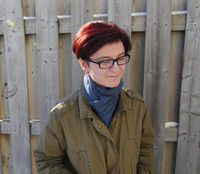Simina Banu Explores Love's Messy Aftermath in Her New Collection
When the acrid smoke of a painful breakup finally clears, what can be salvaged in its wake? It's in this new wasteland of junk food, lies, and other detritus that author Simina Banu's debut full-length collection, POP (Coach House Books) seeks to find an answer.
Examining both past and future, POP employs a variety of poetic styles and perspectives to sift through the clutter of the love poem, taking stock of what still matters and what never did. Through the cathartic noise, a new space is opened and repurposed.
We're thrilled to have Simina at Open Book today to discuss how learning English as a child led to a lifelong obsession with language, being inspired by misread advertisements, and why she can't bring herself to let a single poem do all the work.
Open Book:
Can you describe an experience that you believe contributed to your becoming a poet?
Simina Banu:
I immigrated to Canada when I was five years old, barely knowing any English. This experience led me to perceive language as something opaque and impermeable. It led me to pay extra attention to its uses—I would double check words and phrases and idioms to make sure what I was saying or writing wouldn’t out me as an “other.” This attention to language—in literature, but especially in everyday conversation—is what ultimately led to my interest in poetry and language-play.
OB:
What is the first poem you remember being affected by?
SB:
The first poem that knocked me out was “the lesson of the moth” by Don Marquis. I was struck by its everyday vernacular and lack of punctuation and capitalization, which to me resembled text on the internet. The stylistics were attributed to the idea that it’d been written by an eloquent cockroach, who could only compose by jumping on the keys of a typewriter. But I remember 14-year-old me being thrilled to discover poetry could be colloquial, whimsical and funny, and still so touching. I was hooked.
OB:
What has been your most unlikely source of inspiration?
SB:
Misreadings! I’ll often glance at a billboard or piece of advertising and flip around words or miss a few letters. Once I read a poster saying “are you feeling stressed?” as “are your feelings stressed?” which had a lot of poetic resonance for me and sparked the premise of a piece. I’m always drawn to the sloppy language of television ads, snack aisles, social media—all the dystopian things.
Your CanLit News
Subscribe to Open Book’s newsletter to get local book events, literary content, writing tips, and more in your inbox
OB:
Do you write poems individually and begin assembling collections from stand-alone pieces, or do you write with a view to putting together a collection from the beginning?
SB:
Usually I’ll begin with the intention of writing a single poem, but during the composition process, ideas snowball until I realize they’re not going to all fit into one piece. That’s when I start recalibrating and thinking about a series of poems. It occurred to me that I might just not have the fortitude or attention span to perfect a poem, so I throw my hands up and write some others until together they outline what I was originally going for. Or let’s say it’s compassion. It feels a bit ruthless to make one poem do all the work, so I cut it some slack. I really admire writers who can craft that perfect poem, though.
OB:
What do you do with a poem that just isn't working?
SB:
I try giving it other avenues to express itself! If an idea or feeling isn’t really getting anywhere as a poem, I’ll switch gears and see how it looks as visual art or music. Having done that, when I go back to its poem-form, it feels a bit more open, with new pathways to explore.
_____________________________________________________________________________________________________________
Simina Banu is a writer interested in interrogating her own experience with technology, consumerism, pop culture and the poetics of (un)translation. Her poetry has appeared in numerous journals, including filling Station, untethered, In/Words Magazine and the Feathertale Review . In 2015, words(on)pages press published her first chapbook, where art . Her second chapbook, Tomorrow, adagio, was released in 2019 through above/ground press. POP is her first full length collection of poetry. She lives and writes in Montreal.





